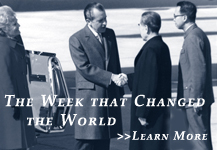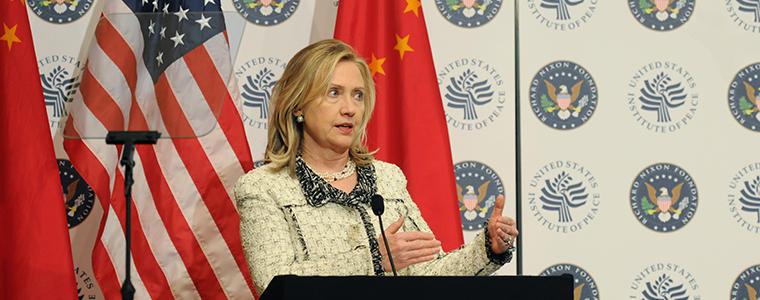 In a broad-ranging review of U.S.-Chinese relations 40 years after President Richard Nixon’s breakthrough trip to China, Secretary of State Hillary Rodham Clinton, appearing at the U.S. Institute of Peace (USIP), said the U.S. approach to China is to foster its rise as a great power that will contribute more to global security and prosperity—becoming, she said, a “full stakeholder” in the international system rather than a “selective” one--while at the same time sustaining American leadership in the world.
In a broad-ranging review of U.S.-Chinese relations 40 years after President Richard Nixon’s breakthrough trip to China, Secretary of State Hillary Rodham Clinton, appearing at the U.S. Institute of Peace (USIP), said the U.S. approach to China is to foster its rise as a great power that will contribute more to global security and prosperity—becoming, she said, a “full stakeholder” in the international system rather than a “selective” one--while at the same time sustaining American leadership in the world.
Clinton made her first visit to the Institute’s new headquarters in Washington to speak at a
day-long March 7 conference co-hosted by USIP and the Richard Nixon Foundation: The Week that Changed the World: President Nixon’s Historic Trip to China and the Future of U.S.-Chinese Relations. The
event drew many of the policy participants involved in the Nixon trip, which heralded the beginning of modern China’s re-entry onto the world stage and altered the course of the Cold War. The secretary of state hailed the transformation of the U.S.-Chinese relationship that ensued, telling those gathered, “We will continue the journey begun by many in this room 40 years ago.”
Earlier in the day, Chinese Foreign Minister Yang Jiechi told the conference on a high definition video link from Beijing that over the last 40 years Chinese-U.S. relations “have kept moving forward despite some ups and downs” and that the two countries have forged “one of the most important bilateral ties in the world today.” Yang laid out general steps for China and the United States “to make steady progress in building China-U.S. cooperative partnership.”
Clinton described the challenge of overcoming U.S. differences with a rising China as requiring nothing less than reversing the tendency of geopolitical history. “We are now trying to find an answer, a new answer to the ancient question of what happens when an established power and a rising power meet,” she said. “Interdependence means that one of us cannot succeed unless the other does as well. We need to write a future that looks entirely different from the past. This is, by definition, incredibly difficult. But we have done difficult things before.”
Even as China continues “its great economic mission” to spread development to millions more of its people, “its power, wealth and influence have pushed it rapidly to a new echelon in the international order,” Clinton said. That contrast has led to tensions, as China at times has sought, in Clinton’s assessment, “to have it both ways, acting like what I call a selective stakeholder. In some forums, on some issues, China wants to be treated as a great power; in others, as a developing nation.” Clinton said that China’s rise “means it can no longer be a selective stakeholder” and should take the responsibility to become a “full stakeholder” in the international system. Allowing emerging powers “to selectively pick and choose elements of the rules-based international system that may on a short-term basis suit their interests would render the system unworkable,” she said, adding that its rules and institutions will need to be adapted and updated.
Clinton said that China can show its willingness to play a positive global role across an array of diplomatic, strategic and economic issues. She called on Beijing to help end violence against civilians in Syria and elsewhere, to explain its military buildup and intentions in Asia and to safeguard cyberspace and global trade and investment rules. She also urged greater economic transparency and fair play by China: “an end to discrimination against U.S. companies and protection for their intellectual property; an end to unfair preferences for domestic firms; and more opportunities for American goods, products and services; and of course, an end to what we see as unfair, distorting currency practices.” And noting “profound disagreements” with Beijing, Clinton asked, “Can China meet its obligations to protect universal human rights and fundamental freedoms?”
Clinton suggested that U.S.-Chinese cooperation will play a key role in the future international system. “Without China and the United States, I doubt that any of our global problems can be solved,” she said. “We are committed to this partnership. And now, we and others around the world are looking for even greater leadership from China.”
Foreign Minister Yang. The top Chinese diplomat emphasized a theme of strengthening what he called a “
China-U.S. cooperative partnership based on mutual respect and mutual benefit,” reflecting an agreement last year between Chinese President Hu Jintao and President Barack Obama. “Thanks to 40 years of hard work by several generations of leaders and people in both countries, China-U.S. relations have come a long way. Our responsibility now is to sustain the growth of China-U.S. relations in the next 40 years and beyond,” Yang said.
Yang reviewed the expansion of the relationship in several areas: frequent high-level exchanges and growing dialogue mechanisms (more than 60 in all currently); two-way trade that has grown from $2.45 billion when diplomatic relations were established in 1979 to $446.6 billion last year; U.S. exports to China rising by 468 percent over the past decade; increasing people-to-people exchanges as well as annual visits by more than three million people to each other’s country; China providing the largest source of foreign students (160,000) in the United States; and Chinese emerging as the second-largest foreign language in the United States after Spanish.
“The dynamic growth of China-U.S. relations over the last 40 years proves that our shared interests far outweigh differences, that cooperation has always been the dominant trend of our relations,” he said. Yang argued that support for a strong bilateral relationship was a “consensus” view in the United States, shared by Democrats and Republicans and by government officials and the general public.
Yang outlined six broad steps to “increase dialogue, enhance mutual trust, deepen cooperation and manage differences”:
- “Keeping to the set direction” in building a cooperative partnership. “No matter what difficulties we may encounter on the way ahead, we should not deviate from the course we have embarked on,” he said.
- “Enhance strategic mutual trust.” Calling for intensifying high-level exchanges, Yang said, “Only with better understanding and more trust can we strengthen the foundation of China-U.S. relations and fully harness the potential for our cooperation.” Yang told the conference: “China is committed to peaceful development. We hope that the United States will see China’s development in the right and objective way, and take more steps to increase our mutual trust.” He described the United States as an Asia-Pacific nation and said “China welcomes a constructive role played by the United States for peace, stability and prosperity in the region.” At the same time, he added, “We hope that the United States will respect China’s interests and concerns in the region.”
- “Adhere to the political foundation of China-U.S. relations.” Yang referred to the Shanghai Communique agreed during the Nixon visit, the Joint Communique on the Establishment of Diplomatic Relations (in which the United States recognized the People’s Republic of China as the sole legal government of China) and the August 17th Communique (which called for strengthening relations in several areas and included a statement that the United States intended to gradually reduce arms sales to Taiwan).
- Pursue cooperation “in an innovative spirit.” Yang said the two countries should “seize opportunities for cooperation new areas such as energy, the environment and infrastructure.” The foreign minister also said he hopes the United States “will guard against any possible interference caused by domestic politics” in upholding cooperation.
- “Strengthen communication and coordination in international affairs.” At the United Nations Security Council and elsewhere, Yang said, the two should abide by the U.N. Charter and “jointly shoulder the responsibility for promoting peace, stability and development in the world.”
- “Encourage people-to-people and local exchanges.” He urged greater flexibility and diversity in exchanges involving nongovernmental organizations, localities, think tanks, the media and youth.
Explore Further

 In a broad-ranging review of U.S.-Chinese relations 40 years after President Richard Nixon’s breakthrough trip to China, Secretary of State Hillary Rodham Clinton, appearing at the U.S. Institute of Peace (USIP), said the U.S. approach to China is to foster its rise as a great power that will contribute more to global security and prosperity—becoming, she said, a “full stakeholder” in the international system rather than a “selective” one--while at the same time sustaining American leadership in the world.
In a broad-ranging review of U.S.-Chinese relations 40 years after President Richard Nixon’s breakthrough trip to China, Secretary of State Hillary Rodham Clinton, appearing at the U.S. Institute of Peace (USIP), said the U.S. approach to China is to foster its rise as a great power that will contribute more to global security and prosperity—becoming, she said, a “full stakeholder” in the international system rather than a “selective” one--while at the same time sustaining American leadership in the world.


